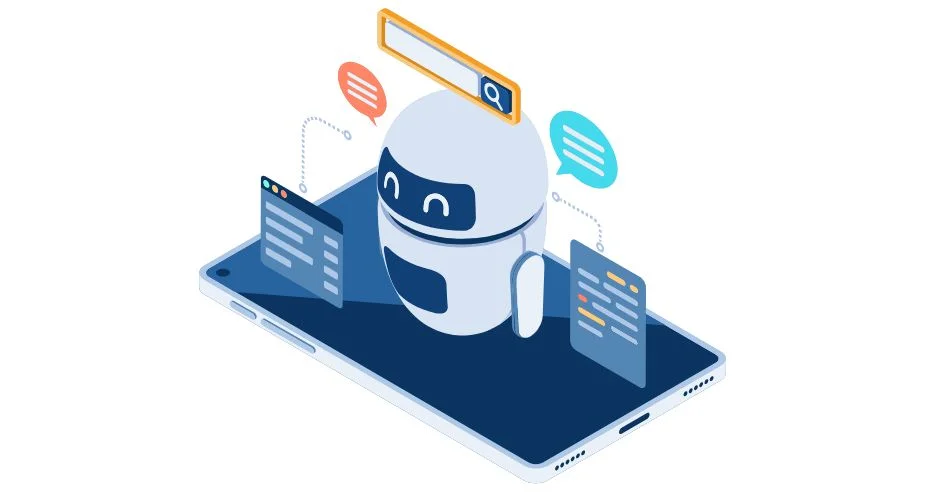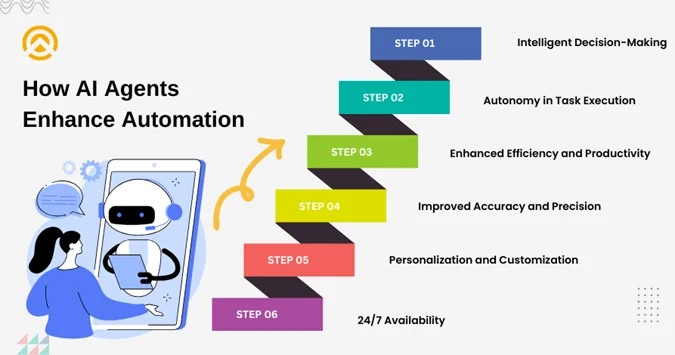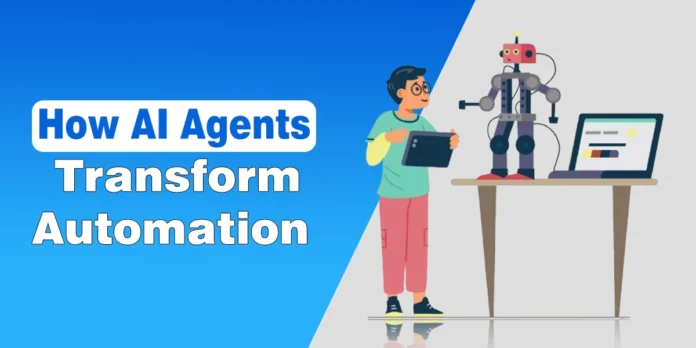As technology is evolving with time, Artificial Intelligence has proven itself as the game changer and playing a vital role in transforming industries. One of the important aspects of this transformation is automation.
AI agents use machine learning, artificial intelligence, natural language processing, the Internet of Things, and data science to perform tasks as humans do. The implementation of intelligence and autonomy helps them to act like humans. As a result, they complete specific tasks, and that’s why, within a short period, AI agents have revolutionized the digital landscape and represented themselves as game changers.
In this article, we will discuss how AI agents are transforming the automation process and the key benefits of opting for them for business.
But, before this let’s start to know about Artificial Intelligence Agents.
What are Artificial Intelligence Agents?
AI agents are software systems that can learn from data and the environment in which they interact. They use the best tools and technologies to get information from unstructured data, and that data-driven information is used to make decisions autonomously.

Traditional automation systems use pre-defined instructions to automate the process. But Artificial Intelligence agents learn from a working environment, adapt, and evolve. Here are the two types of AI agents –
- Reactive Agents
- Deliberative Agents
Reactive agents are those who use predefined rules or specific patterns to complete specific tasks.
Meanwhile, deliberate agents use advanced algorithms to make data-driven decisions in complex working environments.
How AI Agents Enhance Automation
AI agents have become the talk of the town due to their precision and ability to transform business processes to increase efficiency and productivity. Let’s explore how AI agents are empowering businesses to stay ahead of the curve in the competitive world.

1. Intelligent Decision-Making
AI agents are designed to complete specific tasks that generally require human intelligence to complete them. They use advanced AI algorithms to extract data from unstructured data to make data-driven decisions.
In short, they don’t work on the pre-defined specific set of rules and regulations. With the help of machine learning algorithms, AI agents can identify patterns and learn from working environments to make decisions in real time.
For example, AI-driven chatbots in customer service use natural language processing to understand customer queries, learn from previous interactions, and offer more personalized responses over time. Similarly, in the finance industry, they analyze patterns, detect anomalies and fraud activities, and make your platform more safe and secure.
2. Autonomy in Task Execution
Autonomy is one of the key features of AI agents that set them apart from traditional automation systems. The best part of them is they can complete specific tasks without human intervention. Because they act according to the requirements and for that, they use data to make real-time decisions.
According to actions and previous experience, they learn and update themselves to make better decisions, and enhance accuracy, and efficiency. This level of autonomy helps you to reduce human intervention in routine and repetitive tasks.
In industrial automation, they are used in the production lines to optimize the process. In this, they automatically detect anomalies, identify inconsistencies, and inefficiencies, and make instant decisions to improve productivity without taking the help of humans. For example, AI-driven robots in warehouses automatically sort and package items, and for that, they don’t need any human needs. This way, you can streamline the repetitive tasks to improve efficiency.
To enrich your platform with AI agents, you can take the help of an AI automation services provider that will identify your requirements, and offer you solutions that align with your business goals.
3. Enhanced Efficiency and Productivity
AI agents are improving automation to improve efficiency by optimizing processes. Meanwhile, traditional automation solutions have their limitations and they are unable to change themselves according to conditions.
That’s why, the demand for AI agents is increasing to increase efficiency and productivity. Because, they continuously improve their performance by learning and adapting by using data, and environment. This way, you can get optimum results with reduced downtime.
To understand this in a better way, you can take the example of the manufacturing industry. In this, these agents help you to know when a machine can fail by analyzing the sensor data. This predictive maintenance helps to prevent downtime and extend the lifespan of equipment. By automating the maintenance process, they help manufacturers maintain operations efficiently without any kind of human intervention.
4. Improved Accuracy and Precision
There are various industries such as healthcare, manufacturing, logistics, supply chain, finance, etc. where a minor error can create a big problem, and we can experience a lot of consequences. To solve this problem, AI agents are the best.
They excel in performing tasks with a high level of accuracy and precision, and they are doing complex calculations and processes at the same time at a faster speed which is not possible for humans.
You can take an example of the healthcare sector in which AI agents assist radiologists by analyzing medical images to know the early signs of diseases. The AI can check thousands of images and analyze them to detect any kind of issues. All that helps doctors to make accurate treatment plans to diagnose that. You can take the help of an AI agent development services provider to integrate AI agents into your business.
5. Personalization and Customization
AI agents can be tailored to offer personalized experiences and services, and that’s why, such agents are becoming a must-have part of automated systems. This level of customization is giving a big push to businesses to boost their user experience.
AI agents analyze user behavior, preferences, and requirements, and according to that, they offer personalized solutions and services to users. That helps businesses to improve their overall efficiency and productivity.
In retail and e-commerce industries, AI agents analyze users’ browsing patterns, product preferences, purchase histories, etc. to recommend personalized products and services. This way, by offering customized solutions, and services, AI agents are not only improving customer satisfaction but also improving sales.
6. 24/7 Availability
One of the other important aspects of these agents is they can function around the clock without breaks which is not possible in the traditional automation systems. This feature is very important for a wide range of services like customer services, supply chain management, and logistics where such agents are creating a big difference and transforming them in an innovative way. AI agents provide instant support to customer queries to resolve issues, reduce wait time, improve efficiency, and increase customer satisfaction.
AI-powered virtual assistants and chatbots can schedule and manage appointments for businesses to ensure smooth operations while ensuring 24×7 availability. That’s why AI agents have become valuable assets for global businesses to offer 24×7 customer support in different time zones even during non-business hours.
Final Words
Artificial intelligence agents have become valuable assets for businesses to improve their overall efficiency. There are a few challenges but as technologies are evolving at a rapid pace, we are also experiencing advancements in the AI agents.
By offering numerous benefits, they have become a must-have part of an organization to enhance efficiency, accuracy, personalization, and productivity.

